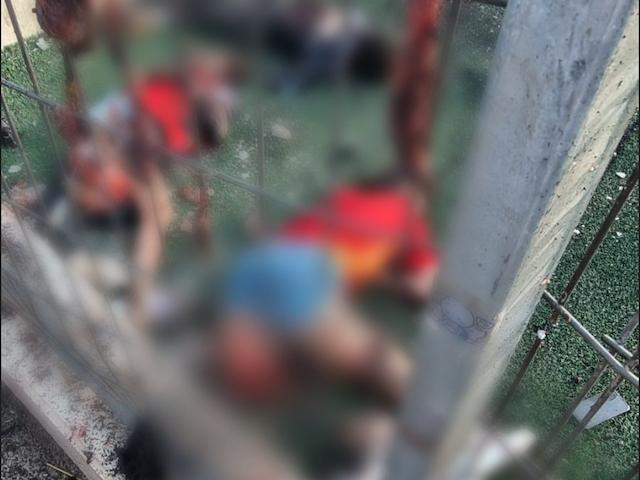In a harrowing and tragic turn of events, a deadly missile strike on a soccer field in the Israel-controlled Golan Heights has dramatically heightened the risk of a full-scale conflict between Israel and Hezbollah. The missile, identified as Iranian-made, was launched from a village in Lebanon, a territory known to be under Hezbollah's influence. Despite the undeniable evidence, the Islamist militant group has denied responsibility for the attack that resulted in the deaths of 12 young people and numerous injuries.
Carnage in Majdal Shams: A Day of Unprecedented Violence
Saturday turned into a day of horror as a rocket struck a soccer field brimming with young people in Majdal Shams, a Druze minority town near the Lebanese and Syrian borders. The aftermath was devastating, with 12 fatalities, predominantly children and teenagers, and around 40 injured. The Israeli military revealed that the rocket carried a significantly heavier warhead than usual, amplifying the destruction.
Her cries broke me 💔
— Emily Schrader - אמילי שריידר امیلی شریدر (@emilykschrader) July 27, 2024
Devastating night for all of Israel #MajdalShams pic.twitter.com/053K6sgOoU
Hezbollah's Denial Amid Overwhelming Evidence
Israel’s military has pointed fingers at Hezbollah for the attack, with Defense Minister Yoav Gallant authorizing a retaliatory response against the U.S.-designated terrorist group. Despite satellite and radar evidence confirming the launch from Hezbollah-run territory and fragments indicating an Iranian-made missile, Hezbollah has denied involvement. This group has been engaging in near-daily exchanges of fire with Israel since the Hamas-led assault on southern Israel on October 7, which resulted in 1,200 deaths and approximately 250 hostages taken. Hezbollah's attacks, commencing on October 8, have been framed as solidarity actions with Gaza.
Some of the innocent victims of #Hezbollah terror attack on #MajdalShams #Israel today. RIP little angels 💔 pic.twitter.com/mDSSMJrN7R
— 🎗️Walid Abu Haya 🇮🇱 (@WalidAbuHaya1) July 27, 2024
A Barrage of Rockets: Lebanon's Hostile Actions
The missile that hit Majdal Shams was part of a larger barrage of about 40 projectiles fired from Lebanon into Israel on Saturday afternoon. Hezbollah claimed responsibility for several attacks on Israeli military targets that day. The Israeli defense establishment, including senior generals and the Defense Minister, convened to assess the situation, while Prime Minister Benjamin Netanyahu expedited his return from Washington to manage the crisis.
Historical Precedent and Response
Israel's response to similar provocations has been swift and decisive. In June, after a similar attack in Hurfeish, another Druze town, Israel targeted military sites deep within Lebanon. The delicate balance maintained between Israel and Hezbollah, characterized by measured strikes to avoid a full-scale war, now hangs by a thread. The fear remains that any miscalculation could spiral into a catastrophic conflict.
A video from Bibi before he left the US to fly back to Israel, cutting his trip a few hours short.
— Raylan Givens (@JewishWarrior13) July 28, 2024
"Israeli citizens, like you, I was shocked. I was shocked to see the terrible pictures following the murderous attack by Hezbollah on Majdal Shams. Among the murdered, small… pic.twitter.com/572ZVrgDje
International Efforts and Broader Implications
This incident underscores the volatile nature of conflict management in the region, as noted by Daniel Sobelman, a research fellow with the Middle East Initiative at Harvard Kennedy School. He emphasized that such incidents reveal the precarious nature of maintaining control over escalation.
Meanwhile, international efforts are underway to prevent a broader regional war. American-led negotiators are striving to find a diplomatic solution, but Hezbollah's stance is clear—they will continue their strikes until the fighting in Gaza ceases. Cease-fire talks have been stagnant for months, with both Arab negotiators and Israel's security establishment blaming Netanyahu for the lack of progress. Netanyahu insists that the fight against Hamas must continue until its destruction, believing military pressure will eventually lead to a deal.
The funeral of the children who were murdered in the Hezbollah massacre in Majdal Shams football field
— Mossad Commentary (@MOSSADil) July 27, 2024
May They Rest in Peace 🕊️ pic.twitter.com/nLIVJZ2DSj
Gaza's Bloody Conflict and Humanitarian Crisis
Gaza also experienced intense violence on Saturday, with Israel targeting a Hamas stronghold within a school in Deir al-Balah, resulting in approximately 30 deaths. Gaza's health authorities reported that the school served as a field hospital. This strike followed Israel's reduction of its humanitarian zone, advising residents to vacate an area previously designated as safe, citing Hamas rocket fire from within that zone.
Upcoming Negotiations: A Glimmer of Hope?
Next week, Rome will host crucial negotiations involving top officials such as CIA Director William Burns, Israeli spy chief David Barnea, Egyptian intelligence chief Abbas Kamel, and Qatari Prime Minister Mohammed bin Abdul Rahman al-Thani. The goal is to finalize a multistage cease-fire proposal, addressing significant issues like the return of Palestinian civilians to northern Gaza, Israel's potential withdrawal from Gaza's border with Egypt, and the framework for future negotiations.
SAY THEIR NAMES!
— Arsen Ostrovsky 🎗️ (@Ostrov_A) July 28, 2024
11 of the 12 children murdered in yesterday’s Hezbollah attack on #MajdalShams have been named:
🕯️ Milad Muadad Alsha’ar, 10
🕯️ Naji Taher Alhalabi, 11
🕯️ Alma Ayman Fakher Eldin, 11
🕯️ Vinees Adham Alsafadi, 11
🕯️ Iseel Nasha’at Ayoub, 12
🕯️ Yazan Nayeif Abu… pic.twitter.com/osg2rKvO8U
As tensions escalate and international diplomats work tirelessly to avert disaster, the world watches closely, hoping for a resolution that prevents further bloodshed and paves the way for lasting peace in the region.


